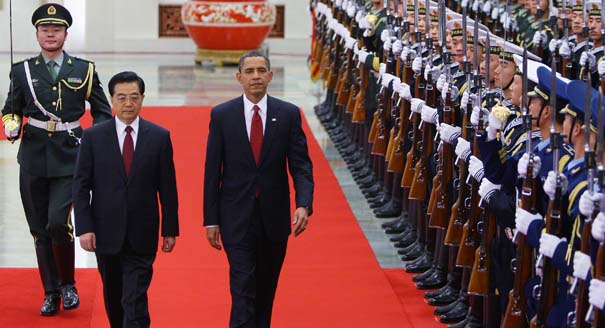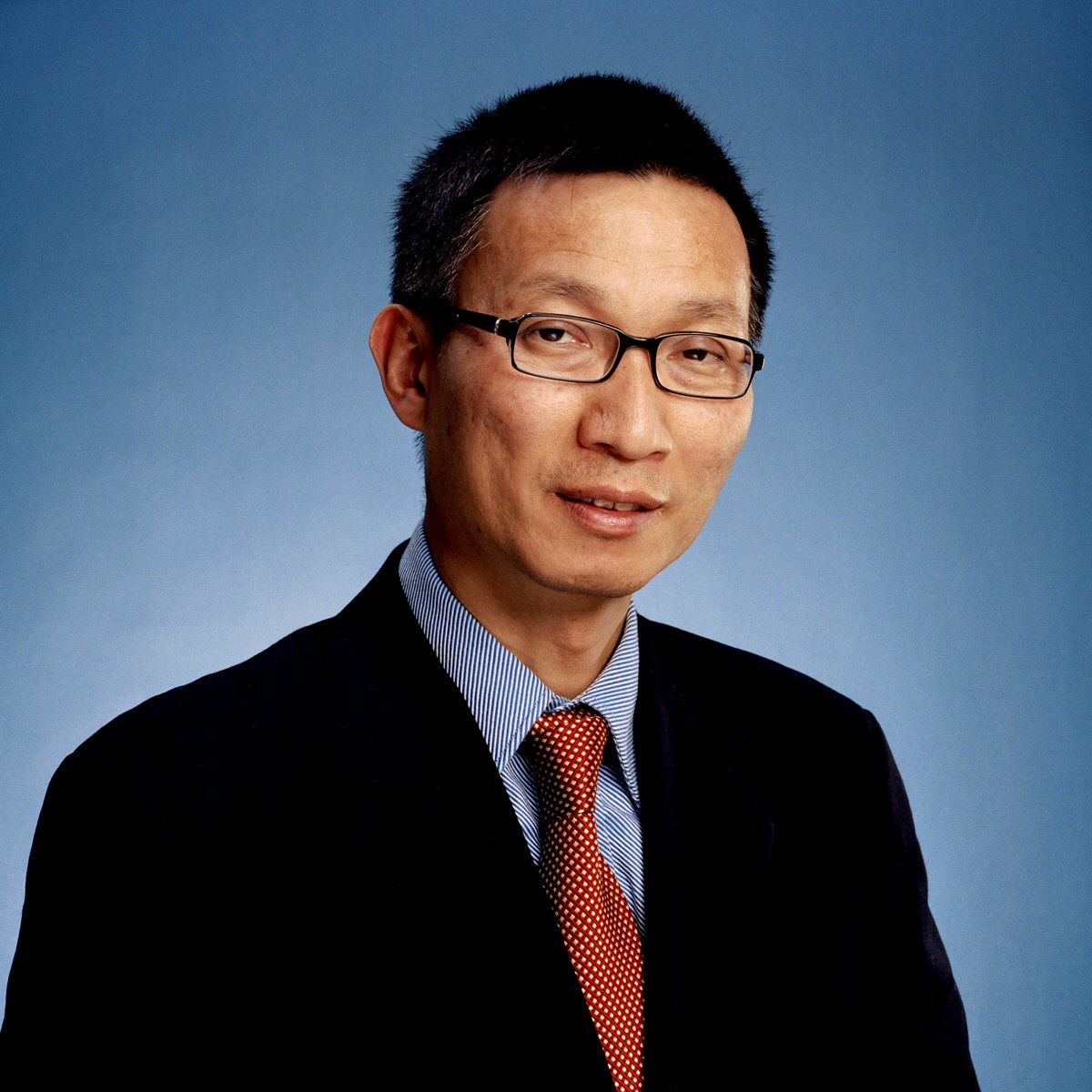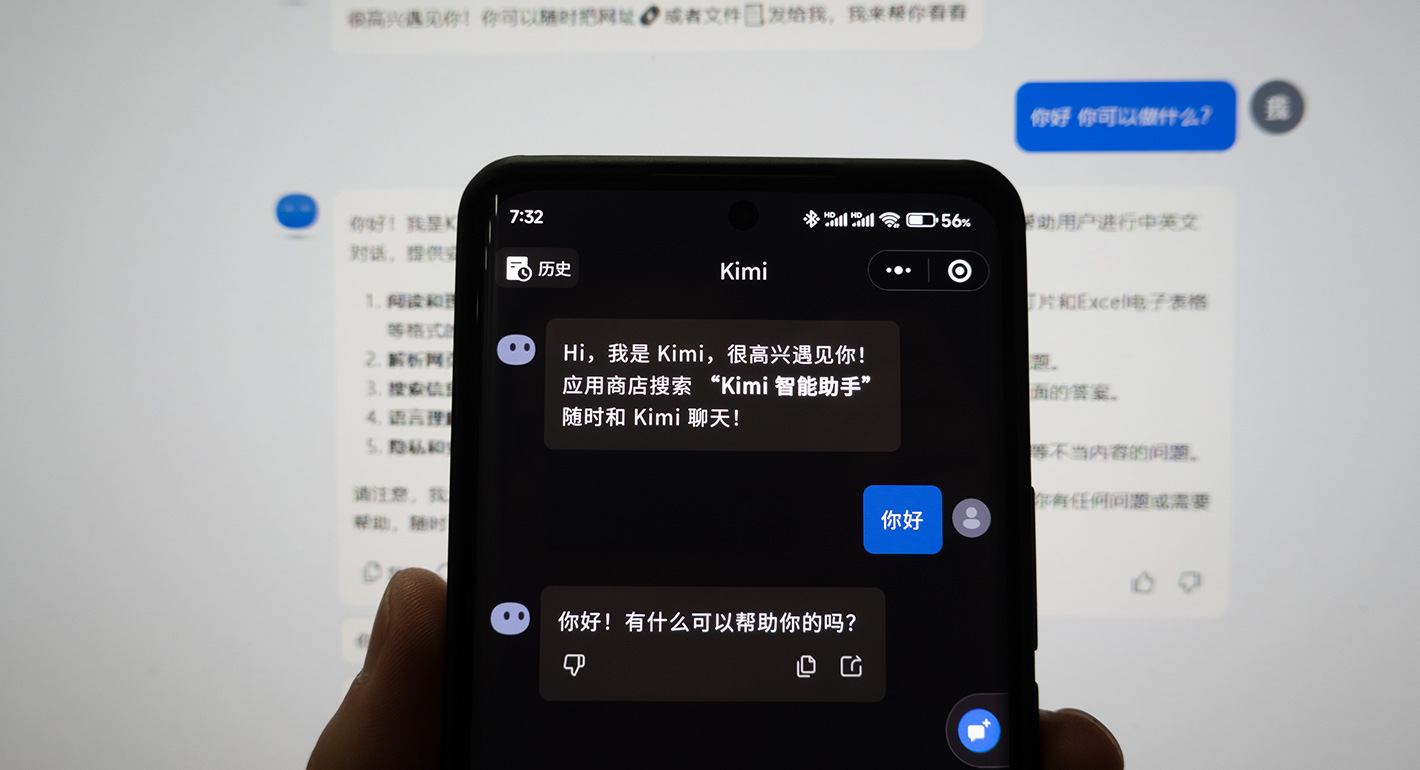Minxin Pei
{
"authors": [
"Minxin Pei"
],
"type": "questionAnswer",
"centerAffiliationAll": "dc",
"centers": [
"Carnegie Endowment for International Peace",
"Carnegie Russia Eurasia Center",
"Carnegie China"
],
"collections": [],
"englishNewsletterAll": "asia",
"nonEnglishNewsletterAll": "",
"primaryCenter": "Carnegie China",
"programAffiliation": "AP",
"programs": [
"Asia"
],
"projects": [],
"regions": [
"East Asia",
"South Korea",
"China",
"Taiwan",
"Japan",
"Southeast Asia",
"North Korea"
],
"topics": [
"Economy",
"Climate Change",
"Security",
"Military",
"Foreign Policy"
]
}
Source: Getty
Obama in Asia
President Obama’s trip to Asia will signal renewed U.S. commitment to this vitally important region. Perhaps the most important stop will be in China, where Obama will seek to ease lingering strategic distrust and discuss key issues of trade, climate change, and security.
This week, President Obama will travel to Asia for the first time since winning the White House. Obama will reassure U.S. allies that Washington hasn’t forgotten about them amid the wars and economic hardships of late, and that it intends to preserve peace and prosperity in the region. In a new Q&A, Minxin Pei discusses the trip.
Arguably the most important stop on Obama’s trip is China. “Cooperation between the two countries is critically important for addressing global challenges, including climate change and economic imbalances, but by itself, it’s not enough,” says Pei. “Talk of a G2 that includes only the United States and China attracts media attention, but doesn’t offer much of a guide for solving the world’s biggest problems.”
- What are President Obama’s goals for his time in Asia? What are the likely highlights of the trip?
- Is America’s influence in Asia rising or falling?
- 30 years after diplomatic ties were restored between the United States and China, President Obama called the relationship between the countries “as important as any bilateral relationship in the world.” How healthy is the relationship?
- China and the United States are sometimes referred to as the G2. Is cooperation between Beijing and Washington necessary or sufficient to solve transnational threats, including climate change, the economic crisis, and nuclear nonproliferation?
- China’s rise is often seen in its growing military capabilities. Will the United States and China deepen military-to-military ties in the Obama administration? What hurdles stand in the way?
- The United States is the biggest single importer of Chinese goods, and China is the largest holder of U.S. Treasuries. Will bilateral trade and China’s currency, the yuan, be major topics of conversation during Obama’s visit and in the years to come?
- In what was viewed as a nod to Beijing during the Dalai Lama’s visit to Washington in October, President Obama declined to meet with him. How will human rights issues impact Sino-American ties and how will Washington react to persistent ethnic tensions in Tibet and Xinjiang?
- Can the United States and China reach a meaningful agreement on climate change?
- In 2012, President Hu Jintao will step down and both the United States and Taiwan will hold presidential elections. How will the change in China and the election in the United States impact the relationship? Cross-strait ties improved after Taiwan’s elections in 2008, but a new leader in Taipei could alter the trajectory. How does Taiwan influence U.S.-China relations?
What are President Obama’s goals for his time in Asia? What are the likely highlights of the trip?
President Obama’s overriding objective for his first trip to Asia this week is to reassure America’s allies and friends there that the United States will remain engaged in the region. Obama’s visit will underscore Asia’s vital importance to American national interests, and America’s commitment to peace and prosperity there.
Obama will also draw on his enormous personal charm to appeal directly to the people in the Asian countries he visits. The image of a charismatic, cosmopolitan, and visionary leader who spent a considerable time in Indonesia should have a powerful effect in restoring America’s prestige in Asia.
The highlights of the trip are likely to be the Asia-Pacific Economic Cooperation summit in Singapore on November 14 and 15, and Obama’s visits to Japan and China. In Singapore, he will meet Asian leaders, most of them for the first time. In Japan, his first stop on the trip, Obama will reaffirm the long-standing U.S.-Japan alliance and reassure Japan that the United States will not allow America’s ties with China to eclipse relations between Washington and Tokyo.
On his first-ever trip to China, Obama will engage the Chinese leadership in substantive discussions of key bilateral issues, including trade, climate change, and regional security. One can expect him to make a serious attempt to reach out to the Chinese people despite the limitations imposed by his official hosts. Live coverage of Obama’s speech on national television, with simultaneous translation, should be the real highlight of his China stop—if it takes place.
Is America’s influence in Asia rising or falling?
The perception in the region is that America’s influence in Asia is declining while China’s is rising. It’s clearly difficult to measure influence accurately, but if one compares the frequency of high-level exchanges between China and its Asian neighbors and that of similar exchanges between the United States and Asian countries, China clearly has an advantage (due mainly to its proximity and the priority it accords to Asia).
The perceived decline of American influence in Asia is due partly to neglect or missteps in Washington. The 1997-98 East Asian financial crisis was a pivotal event for Asia, and the United States did little to shore up the region’s financial system.
In contrast, China committed billions of dollars to a regional currency swap scheme to stabilize the financial system. During the Bush era, senior American diplomats frequently skipped visits to the region’s multilateral forums, disappointing many Asian leaders who were actually eager to have the United States stay engaged in the region and counter-balance China.
Despite this perception, the United States remains the most powerful player in the Asia-Pacific region. It maintains robust security alliances with Japan, Australia, and South Korea. Its Seventh Fleet provides the region with security and peace. And the U.S. market absorbs the largest share of Asia’s exports. That, above all, is why Asia so eagerly awaits Obama’s visit.
30 years after diplomatic ties were restored between the United States and China, President Obama called the relationship between the countries “as important as any bilateral relationship in the world.” How healthy is the relationship?
Health is a relative concept. At the moment, the relationship is stable, mutually beneficial, and mature, but it’s not completely healthy. Despite close economic integration and shared interests, the United States and China have not been able to address the structural impediments to a genuinely healthy bilateral relationship.
Both countries’ economic policies have created huge imbalances—China’s external surpluses and America’s trade and fiscal deficits—that threaten their financial stability and prospects for growth. Politically, China’s one-party system and American democracy are obviously at odds with each other, though Washington and Beijing have wisely managed to work together despite the fundamental differences in their political systems.
But the autocracy-democracy distinction is not theoretical. It lies at the heart of the distrust between the two countries. Translated into geopolitical terms, such suspicions mean that neither China nor the United States can be assured of the other’s long-term strategic intentions. Such uncertainty leads to so-called strategic hedging: China takes actions to prepare for a possible future in which U.S.-China relations are not friendly, and the United States does the same. That is clearly not a hallmark of a completely healthy relationship.
China and the United States are sometimes referred to as the G2. Is cooperation between Beijing and Washington necessary or sufficient to solve transnational threats, including climate change, the economic crisis, and nuclear nonproliferation?
Talk of a G-2 that includes only the United States and China attracts media attention, but doesn’t offer much of a guide for solving the world’s biggest problems. Cooperation between the two countries is critically important for addressing global challenges, including climate change and economic imbalances, but by itself, it’s not enough. There are many indispensable stakeholders, especially the EU and Japan.
In fact, I am not even sure whether the Chinese themselves like the idea of a G2. Of course, it elevates their status, but it also comes with a huge price tag: China will have to shoulder new and costly international responsibilities. At the moment, Chinese leaders have picked a more pragmatic strategy: they will cooperate with the United States in areas where their interests overlap, such as rolling back North Korea’s nuclear program. But on issues where their interests do not overlap, such as resolving the West’s standoff with Iran over its nuclear program, China is reluctant to help the United States.
China’s rise is often seen in its growing military capabilities. Will the United States and China deepen military-to-military ties in the Obama administration? What hurdles stand in the way?
Military-to-military ties are the weakest link in U.S.-China relations. The Obama administration is likely to bring new momentum to this dimension of the relationship in hopes that the Chinese and American militaries can build more confidence in each other. There are some encouraging signs. When a vice chairman of China’s Central Military Affairs Commission visited Washington recently, he was received by President Obama. And Secretary of Defense Robert Gates has also accepted an invitation to visit China. So interaction between the Pentagon and the People’s Liberation Army will increase.
But difficult hurdles remain. In the past, mutual distrust made similar exchanges unproductive. The Chinese military, in particular, has not demonstrated enough reciprocity, giving their American counterparts too little access to their facilities to convince Washington that they are genuinely interested in building confidence and increasing transparency. Of course, the U.S. Congress has imposed some onerous restrictions as well. So as long as the fundamental strategic distrust lingers, it will be hard to deepen the U.S.-China military relationship.
The United States is the biggest single importer of Chinese goods, and China is the largest holder of U.S. Treasuries. Will bilateral trade and China’s currency, the yuan, be major topics of conversation during Obama’s visit and in the years to come?
Bilateral trade will be part of the discussion between President Obama and his Chinese hosts, but he is likely to sidestep the sensitive issue of exchange rate policy. Confronting the Chinese leadership publicly over this issue would be both unproductive and unwise, and could mar the visit without changing anything.
That doesn’t mean the U.S. government won’t bring it up again in the future. In fact, China’s policy of pegging the yuan to the dollar will remain a contentious trade issue between Beijing and Washington as long as bilateral trade imbalances are high and economists believe the yuan is undervalued.
In what was viewed as a nod to Beijing during the Dalai Lama’s visit to Washington in October, President Obama declined to meet with him. How will human rights issues impact Sino-American ties and how will Washington react to persistent ethnic tensions in Tibet and Xinjiang?
Human rights used to feature prominently in U.S.-China relations, but not anymore. This change is due not to a dramatic improvement in the human rights conditions in China, but to the conscious decision by Washington not to allow them to overshadow other vital American interests, namely trade, climate change, and regional security.
To be fair to President Obama, that wasn’t his decision. His administration merely articulated that shift clearly and publicly. President George W. Bush de-emphasized human rights during most of his years in the White House, though he did meet the Dalai Lama.
Given China’s sensitivity to external criticisms of its policies in Tibet and Xinjiang, the Obama administration will likely tread softly. On Tibet, Washington’s policy is to urge Beijing to respect the region’s cultural heritage, religious freedom, and ethnic autonomy. The U.S. government has repeatedly and publicly called on Beijing to enter good-faith negotiations with the Dalai Lama. Regrettably, American admonition, without any real pressure, has accomplished little in Beijing.
The U.S. position on Xinjiang is even more delicate. Other than calling for restraint and respect for human rights, the United States usually shies away from direct criticisms of China over Xinjiang. So far, the ethnic tensions and conflict in these two areas have not adversely affected U.S.-China relations, and Washington’s relatively mild reaction has not upset Beijing.
Can the United States and China reach a meaningful agreement on climate change?
Not on this trip. The two sides are far apart on capping emissions and sharing financial burdens. While China has set an ambitious goal for reducing the carbon intensity of its economy, it has refused to accept mandatory caps on carbon emissions.
China also insists that the rich countries put aside at least one percent of their GDP each year to help developing countries reduce carbon emissions through financial aid and technological assistance. (For the United States, this would mean $140 billion a year on foreign aid related to climate change alone.) The idea will not go over well in the U.S. Congress. In the meantime, as long as Congress fails to produce a strong climate change bill, China is unlikely to soften its position.
In 2012, President Hu Jintao will step down and both the United States and Taiwan will hold presidential elections. How will the change in China and the election in the United States impact the relationship? Cross-strait ties improved after Taiwan’s elections in 2008, but a new leader in Taipei could alter the trajectory. How does Taiwan influence U.S.-China relations?
A leadership change in China and a possible leadership change in the United States in 2012 will not have a serious impact on bilateral relations. In the United States, Democrats and Republicans disagree vehemently on a lot of issues, but China isn’t one of them. In Beijing, Chinese leaders will continue to view a stable relationship with the United States as their most important foreign policy objective. So there should be policy continuity.
The situation in Taiwan is more unpredictable. At the moment, the pro-independence Democratic Progressive Party seems unlikely to reclaim the presidency, but if it does, Taiwan could once again become a source of tension between the United States and China, because it is expected to reverse the conciliatory position of the current Kuomintang government and resort to a more confrontational policy toward Beijing.
Minxin Pei is an adjunct senior associate at the Carnegie Endowment for International Peace and the Tom and Margot Pritzker ‘72 Professor of Government at Claremont McKenna College.
About the Author

Former Adjunct Senior Associate, Asia Program
Pei is Tom and Margot Pritzker ‘72 Professor of Government and the director of the Keck Center for International and Strategic Studies at Claremont McKenna College.
- How China Can Avoid the Next ConflictIn The Media
- Small ChangeIn The Media
Minxin Pei
Recent Work
Carnegie does not take institutional positions on public policy issues; the views represented herein are those of the author(s) and do not necessarily reflect the views of Carnegie, its staff, or its trustees.
More Work from Carnegie Endowment for International Peace
- How Far Can Russian Arms Help Iran?Commentary
Arms supplies from Russia to Iran will not only continue, but could grow significantly if Russia gets the opportunity.
Nikita Smagin
- Is a Conflict-Ending Solution Even Possible in Ukraine?Commentary
On the fourth anniversary of Russia’s full-scale invasion, Carnegie experts discuss the war’s impacts and what might come next.
- +1
Eric Ciaramella, Aaron David Miller, Alexandra Prokopenko, …
- Indian Americans Still Lean Left. Just Not as Reliably.Commentary
New data from the 2026 Indian American Attitudes Survey show that Democratic support has not fully rebounded from 2020.
- +1
Sumitra Badrinathan, Devesh Kapur, Andy Robaina, …
- China Is Worried About AI Companions. Here’s What It’s Doing About Them.Article
A new draft regulation on “anthropomorphic AI” could impose significant new compliance burdens on the makers of AI companions and chatbots.
Scott Singer, Matt Sheehan
- Civil Society Restrictions in North Africa: The Impact on Climate-Focused Civil Society OrganizationsArticle
For climate-focused civil society in countries like Morocco, Algeria, and Tunisia to be most effective, organizations should work together to develop networks that extend their reach beyond their local area and connect across borders to share best practices and amplify each other’s work.
Sarah Yerkes













